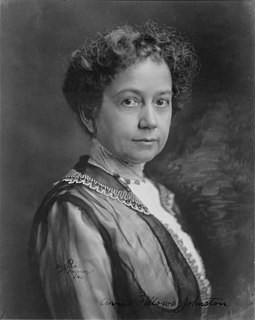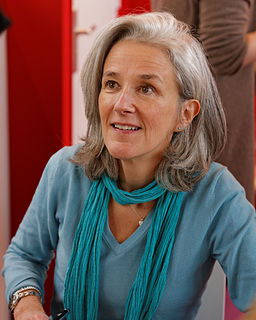A Quote by Annie Fellows Johnston
The little dog-eared books in the meeting-house proved poor reading ... So many of them were about unnaturally good children who never did wrong, and unnaturally bad children who never did right. At the end there was always the word MORAL, in big capital letters, as if the readers were supposed to be too blind to find it for themselves, and it had to be put directly across the path for them to stumble over.
Related Quotes
Every generation likes to think that children don't read as much as they used to when they were young! You listen to some adults saying they were going around reading 'Ulysses' when they were seven or eight! I think children are voracious readers if you give them the right books and if you make those books accessible to them.
There were others, women with stories that were told in a quieter voice: women who hid Jewish children in their homes, putting themselves directly in harm's way to save others. Too many of them paid a terrible, unimaginable price for their heroism. And like so many women in wartime, they were largely forgotten after the war's end.There were no parades for them, very few medals, and almost no mention in the history books.
Granny bit her lip. She was never quite certain about children, thinking of them-when she thought about them at all-as coming somewhere between animals and people. She understood babies. You put milk in one end and kept the other as clean as possible. Adults were even easier, because they did the feeding and cleaning themselves. But in between was a world of experience that she had never really inquired about. As far as she was aware, you just tried to stop them catching anything fatal and hoped that it would all turn out all right.
A house without books is like a room without windows. No man has a right to bring up his children without surrounding them with books, if he has the means to buy them. It is a wrong to his family. He cheats them! Children learn to read by being in the presence of books. The love of knowledge comes with reading and grows upon it.
For the first time in her life Granny wondered whether there might be something important in all these books people were setting store by these days, although she was opposed to books on strict moral grounds, since she had heard that many of them were written by dead people and therefore it stood to reason reading them would be as bad as necromancy. Among the many things in the infinitely varied universe with which Granny did not hold was talking to dead people, who by all accounts had enough troubles of their own.
We never had a catalogue; we never said we were going to duplicate these pots this year and next year and the year after that and so forth. We did make many pots which were repeated, but we allowed them to change and to grow as we changed and grew, and I think that was the big difference. And that's all right; we were working for ourselves. We didn't have anybody we had to pay.
Not to get too deep, but I was brought up by these women who if you wanted to label them, maybe they were feminists, but you know what? They never asked for that or wanted it and they never got up on a soapbox and spoke about it, they just did it. They did their work, they did their jobs, they were who they were.
Hollywood always had a streak of the totalitarian in just about everything it did. The old moguls were essentially hard-fisted authoritarians who had created a system of linked dictatorships to control the creative people. We were supposed to be the children; mad, tempestuous, brilliant, talented, not terribly smart children.
Yes! I did [grow up on a Christmas Tree farm], so this is a good season for me. I was too young to help with the hauling of the trees up the hills and putting them onto cars. So, it was my job to pull off the preying mantis pods off of the Christmas trees. The problem with that is if you leave them on there, people bring them into their house. I forgot to check one time and they hatched all over these people’s house. And there were hundreds of thousands of them. And they had little kids, and they couldn’t kill of them because that’d be a bad Christmas.
There were many books in my parents' home. I'm from a family of five children and we were all readers. And so by the time I left home, I had already read many books, and I was very interested in reading more. That was when I started to have the desire to write. But it wasn't like a divine apparition with angels and seraphins on high. Not for me, at least.
I ran to the children's room: their door was ajar, I saw they had never laid down, though it was past midnight; but they were calmer, and did not need me to console them. The little souls were comforting each other with better thoughts than I could have hit on: no parson in the world ever pictured heaven so beautifully as they did, in their innocent talk; and, while I sobbed, and listened. I could not help wishing we were all there safe together.
At school he had done things which had formerly seemed to him very horrid and made him feel disgusted with himself when he did them; but when later on he saw that such actions were done by people of good position and that they did not regard them as wrong, he was able not exactly to regard them as right, but to forget about them entirely or not be at all troubled at remembering them.
I may have had many projects, but I never was free to carry out any of them. It did me little good to be holding the helm; no matter how strong my hands, the sudden and numerous waves were stronger still, and I was wise enough to yield to them rather than resist them obstinately and make the ship founder. Thus I never was truly my own master but was always ruled by circumstances.
The girl wondered: These policemen... didn't they have families, too? Didn't they have children? Children they went home to? How could they treat children this way? Were they told to do so, or did they act this way naturally? Were they in fact machines, not human beings? She looked closely at them. They seemed of flesh and bone. They were men. She couldn't understand.

































